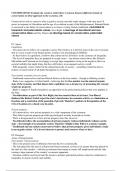CONSERVATISM: Evaluate the extent to which there is tension between different strands of
conservatism on their approach to the economy. (24)
Conservatives seek to conserve what is good in society and only make changes with clear need. It
grows in response to Liberalism and the age of revolution as part of the Enlightenment. Edmund Burke
is renowned as the father of conservatism as we know it today. De ne traditional: committed to
hierarchic and paternalistic values, New Right: a marriage of neo-liberal and neo-
conservative ideas and One Nation: an ideology based on conservative, paternalist
values
P1: Agree:
Capitalism
· All conservatives believe in a capitalist society. They believe it is the best route to the sort of security
that we crave as part of our human nature, owing to our psychological fallibility.
· As they believe in capitalism, it follows that conservatives all believe in the existence of inequality.
· The level of inequality they are prepared to accept varies – one nation conservatives like Disraeli,
Macmillan and Cameron are less happy to accept large inequalities owing to the negative effect on
societal stability that might bring, but they still believe in an unequal society overall.
· With inequality comes a belief in the natural hierarchy of society – something which has been a
feature of conservatism of all kinds throughout its existence.
Free market economics (to an extent)
· Traditional conservatives and neo-liberals believe in the free market – though to differing extents.
· Burke was a supporter of Adam Smith – believing that the free market was the natural organic
state of the economy and that laissez-faire capitalism was a strong way of promoting the concept
of private property.
· Burke’s support of Smith extended to an opposition to the protectionist policies that were popular at
the time.
· Neo-liberalism, as part of the New Right, has free-market ideas at its heart. Neo-liberal
thinkers like Robert Nozick reject the state’s interference in economic activity as a limitation on
freedom and a restriction of the potential of growth. Thatcher’s policies of deregulation of the
City of London are a classic case in point.
Private property
· All conservatives view private property as a vital component of the economy.
· They believe private property provides psychological security to people in society.
· There is disagreement as to how private property does this, however.
· Neo-liberals believe the accumulation of private property reduces individuals’ reliance on the
state – the triumph of an atomistic society. Thatcher’s Right to Buy Policy is a classic example.
· Traditional and one nation conservatives believe that private property gives individuals a stake
in an organic society – it is in our interests to protect and conserve what we have.
P2: Disagree:
Areas of disagreement
Free market v Keynesianism
· This is the greatest area of difference between the two economically.
· The role played by the state in a Keynesian-based economic system is far greater than that played by
the state in a free market – with the government intervening to ensure full employment and the state
owning a large amount of the country’s economic apparatus.
· Taxation could be used to provide the means to produce paternalist policies aimed at a reduction in
inequality, to ensure security and stability.
fi
, · This fundamental difference has seen the Conservative Party change immensely since the emergence
of Thatcher – it broke the One Nation domination seen in the post-war consensus.
· Privatisation, deregulation, disengagement from failing industries, reducing welfare all speak to
the reduction of the role of the state – the “rolling back of the state”.
· For Rand and Nozick, taxation is seen as theft – an unwelcome limitation of liberty.
· Rand argued, as part of her Objectivist approach, that the individual must be free to pursue his
own interests above all – and the free market and small state allows this to happen.
· Nozick wanted a minarchist state – only providing security and internal stability to allow for
successful economic activity by individuals in an atomistic society. Again, the free market underpins
all of this.
Disagreement on doctrinal approach to economic affairs
· Traditional conservatives like Burke may have been supporters of laissez-faire economic thinking, as
suggested above, but Traditional conservatives and one nation conservatives are often seen as only
tepidly supportive of laissez-faire, owing to its doctrinal rigidity, preferring a more pragmatic approach
to economic policy making.
· This led to the 20th century embrace of Keynesianism, which sought reasonable but unspectacular
growth in the economy and allowed the state to place emphasis on protecting and boosting aspects of
the economy as it saw t at the time – see FDR’s New Deal in USA and rise in paternalistic policies of
post-war Conservative governments in the UK.
· Neo-liberalism by contrast is xed in its view that rolling back the state is key – witness Liz Truss’s
eagerness to reduce taxation on her arrival in Downing Street.
· Neo-liberalism is a much more radical outlook, underpinned by a positive belief in our human nature
and a belief that we can be exceptional.
P3: evaluative: agree only to a limited extent
fi fi




